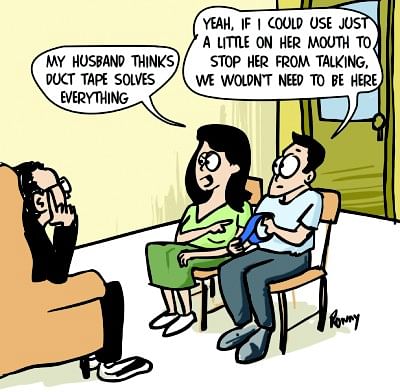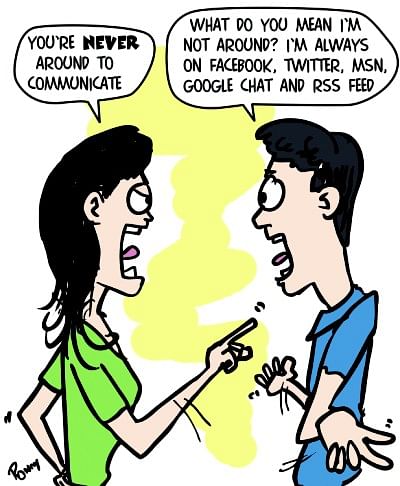| Home - Back Issues - The Team - Contact Us |
 |
| Volume 10 |Issue 25 | July 01, 2011 | |
|
|
Lifestyle The Marriage Doctors ANIKA HOSSAIN
We live in a society where for centuries, marriage has been considered a sacred bond, one that is everlasting and unbreakable. Up until a few decades ago, the concept of divorce was an absolute taboo among certain social circles, and when a rare case of a broken marriage did surface, it became the talk of town--the unfortunate couple treated as social pariahs till the scandal blew over. However, we have come a long way, and have embraced modernity and incorporated it in every aspect of our lives, including our relationships. Among the middle and the upper class especially, divorce is no longer considered an abominable sin, so much so, that the divorce rate has increased significantly in recent times. Contrary to popular belief, this is not because people no longer respect the sanctity of marriage, but because they view marriage differently than the generations before them. "No one wants their marriage to end," says psychiatrist Dr M Omar Rahman, "There has been a shift in terms of what people expect from marriages. In the past, all that was necessary for a good marriage was a husband/ wife who was not abusive, a good father/mother and a husband who could provide for his family. Back then, they did not understand the concept of two people simply not relating to one another, not understanding eachother and making a connection and therefore being unhappy." Expectations have changed, and more people are realising that they don't have to remain in an unhappy marriage, because they have options open to them. However, not all couples end their marriage before giving it some serious thought and effort. Nowadays, an increasing number of couples seek professional help before they make their final decision to part ways. "I have been practicing psychiatry for the past eight years," says Rahman, "And I would say that marriage counselling has become much more prevalent than it was eight years ago. I have clients who are from the middle class and those who are very wealthy. Since I have a private practice so I don't usually get clients who are from the lower income groups, but my clients are not all super rich. Overall I think it is something that has become more acceptable to the middle class and I find that interesting." According to Rahman, many married couples in Bangladesh try to solve their problems among themselves or rely on their extended families to help them. "As a therapist I will say that trying to resolve issues within the extended family is always a mistake. Because people have a vested agenda. A professional does not have a vested interest and can be objective. The role of a marriage counselor is simply to make sure both parties have thought through why they are, where they are at in their marriage, and what the possible psychological consequences can be of staying together or deciding to leave. "We always tell our clients, that the role of the therapist is not to preserve the marriage. We never tell people what to do, we tell them they should make decisions based on the complete picture and not based on false understandings or impressions," says Rahman. Because the concept of marriage counseling is fairly new, most of the time, couples end up opting to go to a counselor when it is too late to salvage the marriage. Rahman says, "Unfortunately what happens is, people come at the last moment --usually when one partner or the other has made up their minds firmly that they want out. At this point it is very unlikely that much will change. But the positive thing is that people now accept that there are certain things that cannot be resolved within the family and the couple should seek outside help." Most people don't know what to expect from their therapists, and have a notion that they will work their magic and instantly solve their problems. But it is not that simple. The decision to see a counselor has to come from both parties and it has to be taken when the couple first starts realising they have a problem. At times, family members may force the couple to seek outside help, but in these cases, the therapist cannot provide much assistance. Once a couple decides to get help, they must commit to the process, which may take months or sometimes even years depending on the nature of their problems. It is therefore absolutely necessary to be dedicated to and have faith in the process. It is important to keep in mind that change will not happen over night.
The counseling process usually involves separate sessions with each partner, during which they try to resolve their individual problems until they are ready to come together for a joint session. However, it is not as easy as it sounds-during these sessions, people are required to be painfully honest about themselves and share things with the therapist that they never shared with anyone else. "They have to do this in order for me to really understand the problems," says Rahman. "Usually, one partner has no idea there is a problem. They'll come and tell me they thought things were going really great and suddenly their partner tells them it's over and that s/he has been unhappy for a long time," says Rahman. On the other hand, the partner who is unhappy is amazed that they have been misunderstood for so long and attributes it all to the lack of connection between them. "And its not always the men," says Rahman, "Statistics say that two thirds of all divorces are initiated by women. In my experience as a therapist I have seen that men very rarely want to get out of a marriage. You may say this is partly hypocritical because the event that precipitates the break maybe something done by the man, usually extramarital relationships which when discovered, they claim don't mean anything. In these cases the wives claim that this might happen again and they cannot trust their husbands. My experience practicing here and the data in the west suggests that women initiate the divorce, stating they have had enough and are better off being by themselves." As surprising as it may sound, for those who were under the misconception that it is the men who always leave, women nowadays have many reasons to want to end an unhappy relationship. A man may be having an affair, but at the same time, he may still love his wife and children the same way. For him, they may be two completely separate aspects of his life, which are completely unrelated. At the back of their minds, however, they know they are in the wrong, and once discovered it is extremely difficult for his partner to trust him again. In these cases, women usually want a divorce. According to Rahman, nowadays women are better educated and more financially independent-- they have options which they did not in the past. In many cases, women also have family support when they choose to leave their husbands and now, they have the support of the society. Not all marriages end because of infidelities, and the ones that don't are harder to get out of, "I think nowadays, people look for that connection, moner mil ás they say in Bangla," says Rahman, "Particularly because of modernity, which is about valuing the individual needs over the larger structure of family, community and valuing privacy. I think divorce has become more common among the middle class in Bangladesh." Unfortunately, if one no longer feels valued and cared for in a relationship, they must make the tough decision to address their problems and come to a decision which they think is best for them. One good thing about this modern mindset is that no one says you should stay in an abusive relationship. "Women who are in abusive relationships are less likely to leave their husbands than those who are not because of various deep-rooted psychological reasons," says Rahman "Among these are women who are highly educated, are financially independent and have supportive parents, but they will not leave. I personally don't counsel couples in abusive relationships, because these problems between the couple cannot be resolved, it is a cycle that will keep repeating itself" says Rahman. Marriage counseling overall, helps couples understand each other, and their issues, and helps them see clearly, where they stand in their relationship. It does not always end in a reconciliation, but it may assist the couple to make a decision about whether it is worth it to stay in their marriage or if it is better to simply move on. "Ever since there have been relationships, there have also been problems in relationships, no relationship is without its problems," says Rahman, "Relationships are unpredictable by nature and you need to be aware of that and not think that you will not be able to survive if your partner leaves. The reality is, you never know. You can do everything right, be the perfect partner and your husband or wife may still want to leave." A relationship is built by two people and both have to make a commitment to see it through. Sometimes, one person may just not feel the same way anymore, but that does not necessarily reflect badly on the other. We Bangladeshis have embraced modernity, but it may take some time before it is weaved intricately into our system. Until then, we can take small steps in the right direction and work toward change. Copyright
(R) thedailystar.net 2011 |

 Rahman says, "I always tell my clients that my job is to help both of you to think about what you are doing and make sure the decision you make is based on an accurate understanding of what has gone on so far and what will happen in the future, if you do or do not stay in the marriage. Also, think about the impact of your decision on your family, your children and your friends. The therapist is not a coach, the therapist is someone who is there to hold a mirror and say look, this is what you are doing. Do you understand what you are doing? People who want to leave always discount the negatives because they have already made their decision. One of the things we say as therapists is the unpalatable truth, it may be the right decision for you but it may be bad for your children and vice versa."
Rahman says, "I always tell my clients that my job is to help both of you to think about what you are doing and make sure the decision you make is based on an accurate understanding of what has gone on so far and what will happen in the future, if you do or do not stay in the marriage. Also, think about the impact of your decision on your family, your children and your friends. The therapist is not a coach, the therapist is someone who is there to hold a mirror and say look, this is what you are doing. Do you understand what you are doing? People who want to leave always discount the negatives because they have already made their decision. One of the things we say as therapists is the unpalatable truth, it may be the right decision for you but it may be bad for your children and vice versa."